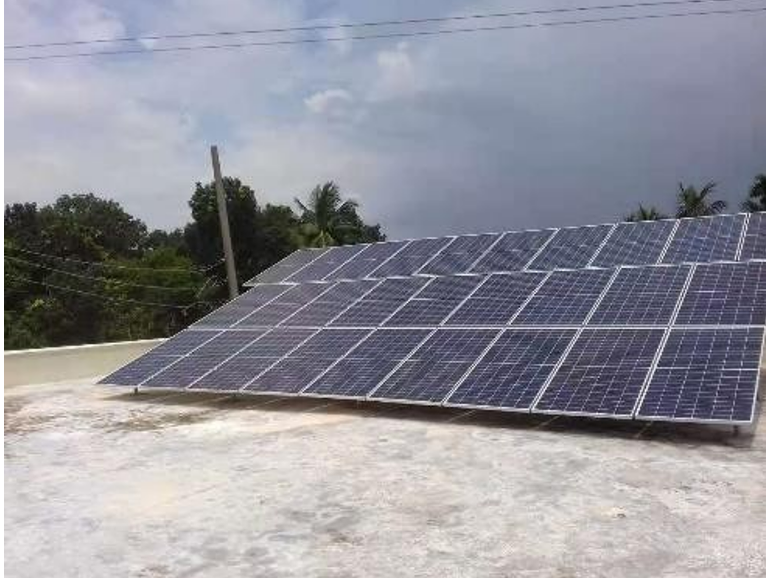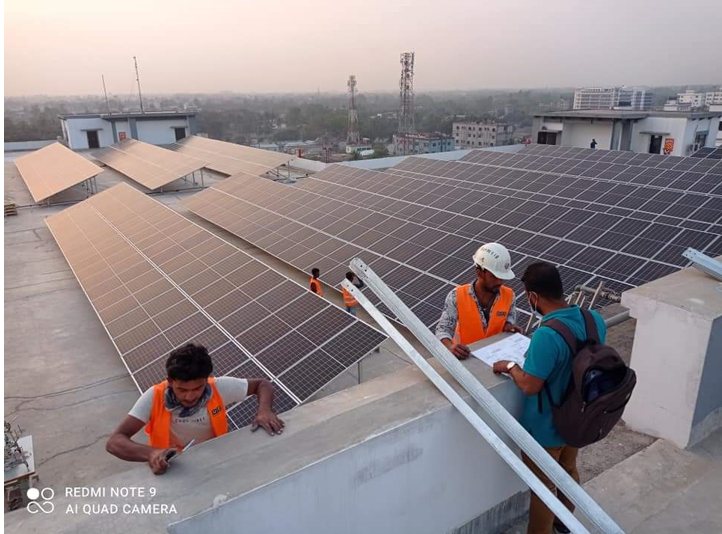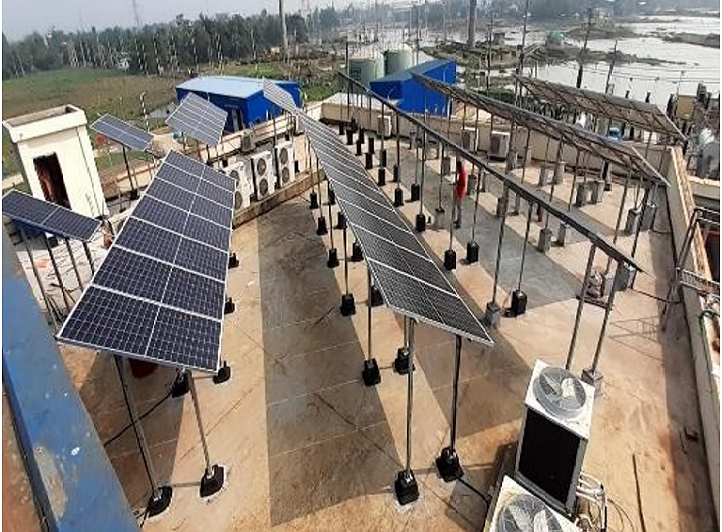By Reema Islam, Communications and Knowledge Management Expert, Integrated National Financing Framework for Accelerating Achievement of SDGs (INFF4SDGs) in Bangladesh
Setting up solar panels in Gazipur, courtesy of GMS Textiles
Solar panels in Gazipur, courtesy of Rural Power Company Ltd
In 2018, the fashion Industry formalized their stance towards cleaner energy by signing a Fashion Charter, of the United Nations Framework Convention on Climate Change (UNFCCC). Major industries and fashion brands signed this charter and multiple countries – including Bangladesh, became signatories. Bangladesh Garments Manufacturers and Exporters Association (BGMEA) is a signatory and two other members, with an active presence in Bangladesh are the fashion houses PUMA and H&M, where H&M has pledged to become carbon neutral by 2030 & carbon positive by 2040 and PUMA is committed towards a 35% reduction in carbon emissions by 2030.
Solar panels in Sirajgonj courtesy of NESCO |
 |
In 2018, under UN Climate Change, the Fashion Industry Charter for Climate Action was created with a mission to drive the fashion industry to net-zero Greenhouse Gas emissions no later than 2050, in line with keeping global warming below 1.5 degrees.
The Joint Program INFF4SDGs is supporting the Government of Bangladesh to implement an integrated financing framework to more effectively mobilize required resources from public and private sources for attaining SDGs by 2030. Under INFF4SDGs, H&M & PUMA partner with UNDP Bangladesh to assess the constraints and catalysts within the apparel industry in Bangladesh, that can help the Ready Made Garments (RMG) sector to slowly transition towards greener energy. INFF4SDGs works with three SDGs (6, 7 & 13) where the premise of SDG 7 specifically outlines the need for greener energy: “Goal 7 of the SDGs, Affordable and Clean Energy, aims at ensuring everyone has access to affordable, reliable, and modern energy services by the year 2030”. As part of the activities aligned with SDG7, the consulting firm PwC was brought on board to conduct an assessment in RMG factories, identifying the required policy reforms, constraints and possible approaches towards shifting the production process towards green energy.
INFF4SDGs strengthens its collaborations with the RMG sector through this initiative as it previously supported BGMEA in Sustainability Self Reporting of 47 RMG industries, measuring impact of the private sector in line with National Priority Indicators (NPIs) and SDGs. Based on these experiences and inspiration from Principal SDG Coordinator’s Office, INFF4SDGs in partnership with BGMEA is set to scale-up this initiative to a hundred factories.
As part of the assessment study for factories transitioning towards greener energy, PwC organized a FGD in December 2021, with representatives from the RMG sector, factory owners and Renewable Energy (RE) producers and suppliers, to chalk out the various areas for improvement and the gaps which can be filled through cooperation. Stakeholders shared best possible solutions, optimistic approaches and suggestions for a way forward, which will foster more meaningful discussions with other stakeholders of the INFF4SDGs project, such as financial institutions, RMG players, Associations, etc. The FGD brought out some issues like policies that can be tweaked to ease the pathways for making RE more easily available and applicable. The need to set realistic targets also came up as the government had looked at 5% of RE in 2015 and 10% for 2020, with only 3% of these targets being met so far. At the COP 26, the Honorable Prime Minister announced a 40% target of energy sources to be met by renewable energy by 2041, raising a greater need for a realistic approach, for garments factories transitioning towards greener and cleaner energy. Several deterrents were mentioned for setting up a more functional RE model like the lack of land for RE plants, as only agricultural land can be used for this purpose. Proposals were put forth to use the rooftops of factories, to set up the RE system, where the government could either subsidize these factories or pay a certain rent for using the rooftops, in the initial stages. Until RE is truly incorporated within the majority of factories, these practical solutions which increases the public/private collaborations could pave the pathway towards greener energy.
Partnering with the INFF4SDGs project, helped us get a deeper understanding on the policy environment, including the limitations and opportunities, for a greed transition that will ultimately enable the journey towards carbon neutral by 2030 & carbon positive by 2040. We are a small part of the bigger puzzle which involves conducive policies and expansive collaborations and this process of learning from the others would help us move towards greener energy." Masarrat Quader, H&M, Regional Public Affairs and Stakeholder Engagement Manager.
The goals set by the SDGs 2030 agenda for reduced carbon emissions and greener energy, offers the garments sector a competitive edge that is required to win more markets for its exports. INFF4SDGs aims to use this baseline study to prepare an action plan, that helps speed up the process of RMG factories transitioning towards greener energy and for Bangladesh to meet its SDG 2030 targets.

 Locations
Locations
